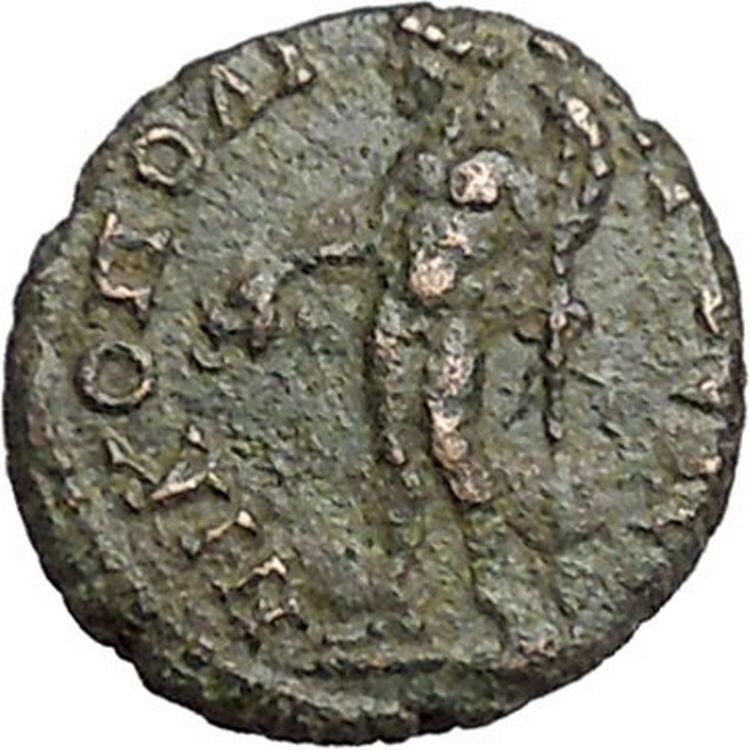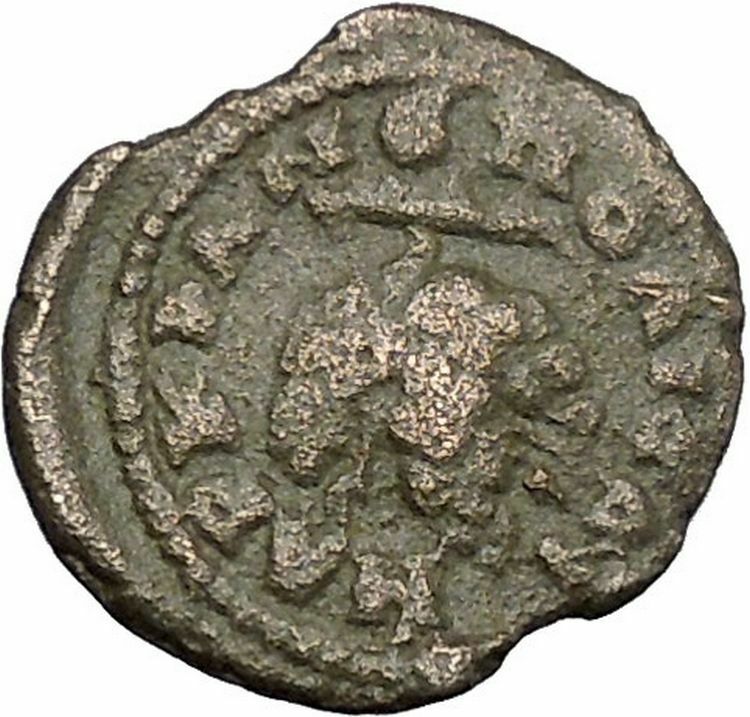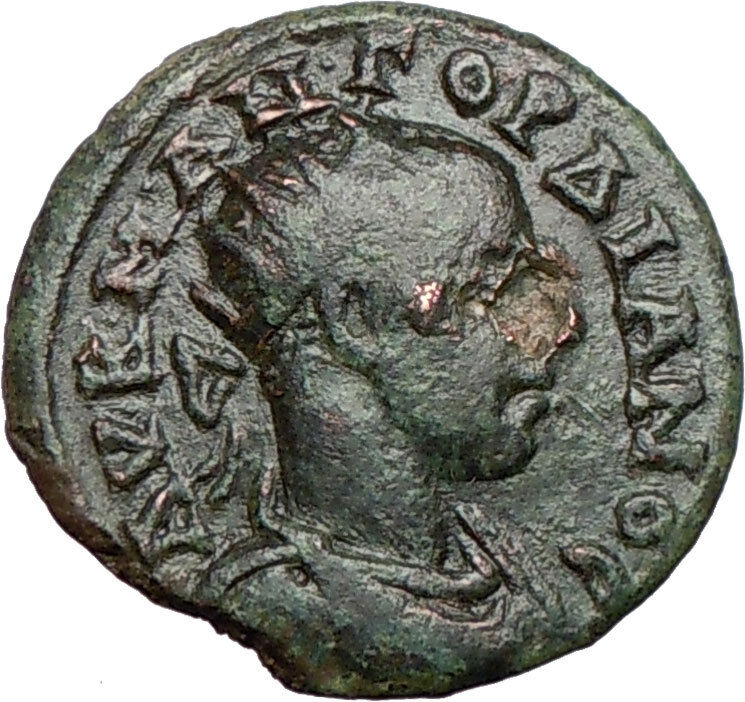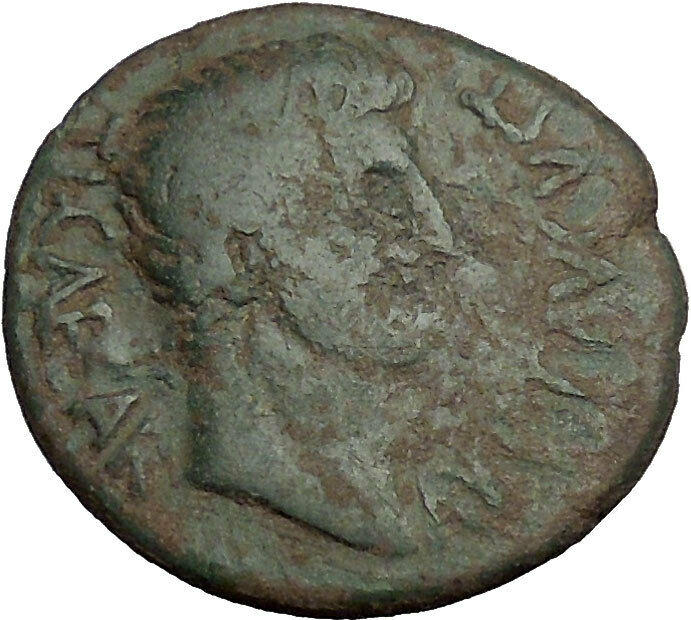|
Macrinus – Roman Emperor: 217-218 A.D.
Bronze 21mm (5.86 grams) of Parion (Parium) in Mysia
Reference: SNG von Aulock -; SNG Copenhagen -; SNG BN 1502; BMC 111; Numismatik Naumann 47, lots 305-6; CNG E-387, lot 297; CNG E-382, lot 236.
IMP C M OPE SEV MACRINVS, Laureate, draped and cuirassed bust right.
C G I H P, Capricorn right, with globe between hooves and cornucopia over shoulder.
Parium (or Parion), a city of Mysia, founded circa 710 B.C. on the north coast of the Troad, on the shores of the Propontis, between Lampsakos and Priapos, was founded by a colony from Miletos, mingled with natives of Paros and Erythrae, and became a flourishing seaport through the excellence of its harbor, having a better harbor than that of Priapos. Under Augustus it was made a Roman colony, by the name of Colonia Pariana Julia Augusta. It was a renowned seat of the worship of Eros, Dionysus, and Apollo.
You are bidding on the exact item pictured, provided with a Certificate of Authenticity and Lifetime Guarantee of Authenticity.
 Capricorn (♑) is the tenth astrological sign in the zodiac, originating from the constellation of Capricornus. It spans the 270-300th degree of the zodiac, corresponding to celestial longitude. Capricorn is ruled by the planet Saturn. Under the tropical zodiac, the sun transits this area from December 22 to January 19 each year, and under the sidereal zodiac, the sun currently transits the constellation of Capricorn from approximately January 15 to February 14. In astrology, Capricorn is considered an earth sign, introvert sign, and one of the four cardinal signs. Capricorn (♑) is the tenth astrological sign in the zodiac, originating from the constellation of Capricornus. It spans the 270-300th degree of the zodiac, corresponding to celestial longitude. Capricorn is ruled by the planet Saturn. Under the tropical zodiac, the sun transits this area from December 22 to January 19 each year, and under the sidereal zodiac, the sun currently transits the constellation of Capricorn from approximately January 15 to February 14. In astrology, Capricorn is considered an earth sign, introvert sign, and one of the four cardinal signs.
Zodiac symbol Goat Duration (tropical, western) 22 December – 20 January (2014, UTC) Constellation Capricornus Zodiac element Earth Zodiac quality Cardinal Sign ruler Saturn Detriment Moon Exaltation Mars Fall Jupiter
Capricorn-Sagittarius cusps (those born from December 22 to December 28) are considered to be slightly different from the typical Capricorn, being more outgoing, jovial and less ambitious and money-orientated than the Capricorn who is not born on a cusp.
Macrinus – Roman Emperor: 217-218 A.D.
| Augustus: 217-218 A.D. (217-218 A.D. – Sole Reign) (218 A.D. with Diadumenian) |
| Father of Diadumenian |
 Macrinus (Latin: Marcus Opellius Severus Macrinus Augustus; c. 165 – June 218) was Roman Emperor from April 217 to 8 June 218. He reigned jointly with his young son Diadumenianus. Macrinus was by origin a Berber from Mauretania Caesariensis. A member of the equestrian class, he became the first emperor who did not hail from the senatorial class and was the first emperor from Mauretania. Before becoming emperor, Macrinus served under Emperor Caracalla as a praetorian prefect and dealt with Rome’s civil affairs. He later conspired against Caracalla and had him murdered in a bid to protect his own life, succeeding him as emperor. Macrinus (Latin: Marcus Opellius Severus Macrinus Augustus; c. 165 – June 218) was Roman Emperor from April 217 to 8 June 218. He reigned jointly with his young son Diadumenianus. Macrinus was by origin a Berber from Mauretania Caesariensis. A member of the equestrian class, he became the first emperor who did not hail from the senatorial class and was the first emperor from Mauretania. Before becoming emperor, Macrinus served under Emperor Caracalla as a praetorian prefect and dealt with Rome’s civil affairs. He later conspired against Caracalla and had him murdered in a bid to protect his own life, succeeding him as emperor.
Macrinus was proclaimed emperor of Rome by 11 April 217, while in the eastern provinces of the empire, and was subsequently confirmed as such by the Senate; however, for the duration of his reign he never had the opportunity to return to Rome. His predecessor’s policies had left Rome’s coffers empty and the empire at war with several kingdoms, including Parthia, Armenia and Dacia. As emperor, Macrinus first attempted to enact reform to bring economic and diplomatic stability to Rome. While Macrinus’ diplomatic actions brought about peace with each of the individual kingdoms, the additional monetary costs and subsequent fiscal reforms generated unrest in the Roman military. Julia Maesa, taking advantage of the unrest, instigated a rebellion to have her fourteen-year-old grandson, Elagabalus, recognized as emperor. Macrinus was overthrown at the Battle of Antioch on 8 June 218 and Elagabalus proclaimed himself emperor with support from the rebelling Roman legions. Macrinus fled the battlefield and headed for Rome, but was captured in Chaceldon and later executed in Cappadocia. He sent his son to the care of Artabanus V of Parthia, but Diadumenianus was also captured and executed. After Macrinus’ death the Senate declared him and his son enemies of Rome and had their names struck from the records and their images destroyed.
Background and career
Macrinus was born in Caesarea Mauretaniae (modern Cherchell, Algeria) in the Roman province of Mauretania to an equestrian family of Berber origins. He received an education which allowed him to ascend to the Roman political class. Over the years he earned a reputation as a skilled lawyer and under Emperor Septimius Severus he became an important bureaucrat. Severus’ successor Caracalla later appointed him a prefect of the Praetorian Guard.
While Macrinus probably enjoyed the trust of Emperor Caracalla, this may have changed when, according to tradition, it was prophesied that he would depose and succeed the emperor. Macrinus, fearing for his safety, resolved to have Caracalla murdered before he was condemned.
In the spring of 217, Caracalla was in the eastern provinces preparing a campaign against the Parthian Empire. Macrinus was among his staff, as were other members of the Praetorian Guard. In April, Caracalla went to visit a temple of Luna near the site of the battle of Carrhae and was accompanied only by his personal guard, which included Macrinus. On April 8, while traveling to the temple, Caracalla was stabbed to death by Justin Martialis, a soldier whom Macrinus had recruited to commit the murder. In the aftermath, Martialis was killed by one of Caracalla’s men.
For two or three days, Rome remained without an emperor. By April 11, Macrinus had proclaimed himself emperor and taken for himself all of the imperial titles and powers, without waiting for the Senate. The army backed his claim as emperor and the Senate, so far away, was powerless to intervene. Macrinus never had a chance to return to Rome as emperor and remained based in Antioch for the duration of his reign. Macrinus was the first emperor to hail from the equestrian class, rather than the senatorial and also the first emperor of Mauretanian descent. He adopted the name of Severus, in honor of the Severan dynasty, and conferred the imperial title of Augusta to his wife Nonia Celsa and the title of Caesar and name of Antoninus to his son Diadumenianus, thus making him a junior co-emperor, in honor of the Antonine dynasty. At the time of Diadumenian’s accession he was eight years old.
Reign
Despite his equestrian background, Macrinus was accepted by the Senate for two reasons: for the removal of Caracalla, and for having received the loyalty of the army. The senators were less concerned by Macrinus’ Mauretanian ancestry than by his equestrian social background and scrutinized his actions as emperor. Their opinion of him was reduced by his decisions to appoint men to high offices who were of similarly undistinguished background. Only the Senate had the constitutional power to choose the emperor from among the senators and Macrinus, not being a senator and having become emperor through force rather than through traditional means, was looked down upon.
Macrinus had several issues that he needed to deal with at the time of his accession, which had been left behind by his predecessor. As Caracalla had a tendency towards military belligerence, rather than diplomacy, this left several conflicts for Macrinus to resolve. Second, Caracalla had been a profligate spender of Rome’s income. Most of the money was spent on the army; he had greatly increased their pay from 2,000 sesterces to 3,000 sesterces per year. In turn, Caracalla had stripped bare whatever sources of income he had. This left Rome is a dire fiscal situation, which also had to be resolved by Macrinus.
Macrinus was at first occupied by the threat of the Parthians, with whom Rome had been at war since the reign of Caracalla. Macrinus settled a peace deal with the Parthians, after fighting an indecisive battle at Nisibis in 217. In return for peace, Macrinus was forced to pay a large indemnity to the Parthian ruler Artabanus V. Simultaneously, Rome was under threat from Dacia and Armenia; any deal with Parthia might have been beneficial to Rome. Next, Macrinus turned his attention to Armenia. He settled a peace treaty with them by returning the crown and loot to Tiridates and releasing his mother from prison, returning Armenia to its status as a client kingdom of Rome. Macrinus made peace with the Dacians by releasing hostages, though this was likely not handled by himself but by Marcius Agrippa. In matters of foreign policy, Macrinus showed a tendency towards settling disputes through diplomacy and a reluctance to engage in military conflict, though this may have been due to lack of resources and manpower than his own personal preference.
Macrinus began to overturn Caracalla’s fiscal policies and moved closer towards those that had been set forth by Septimius Severus. One such policy change involved the Roman legions; the soldiers that were already enlisted during Caracalla’s reign enjoyed exorbitant payments, it would be impossible for Macrinus to reduce enlisted soldiers’ pay without them rebelling and so instead reduced the pay of new recruits to the level that had been set by Severus. Macrinus revalued the Roman currency, increasing the silver purity and weight of the denarius from 50.78 percent and 1.66 grams at the end of Caracalla’s reign to 57.85 percent and 1.82 grams from Fall 217 to the end of his reign, so that it mirrored Severus’ fiscal policy for the period 197-209 A.D. After 209 A.D. Macrinus’ goal with these policies might have been to return Rome to the relative economic stability that had been enjoyed under Severus’ reign, though it came with a cost. The fiscal changes that Macrinus enacted might have been tenable otherwise, but not for the military. By this time the strength of the military was too great and by enacting his reforms he angered the soldiers and paved the way for his downfall.
Caracalla’s mother Julia Domna was initially left in peace when Macrinus became emperor. This changed when Macrinus discovered that she was conspiring against him and had her placed under house arrest in Antioch. By this time Julia Domna was suffering from an advanced stage of breast cancer and soon died in Antioch, possibly by starving herself. Afterwards, Macrinus sent Domna’s sister Julia Maesa and her children back to Emesa in Syria, from where Maesa set in motion her plans to have Macrinus overthrown. Macrinus had decided to remain in Antioch instead of going to Rome upon being declared emperor, a step which furthered his unpopularity in Rome and contributed to his eventual downfall.
Downfall
Julia Maesa had retired to her home town of Emesa with an immense fortune, which she had accrued over the course of twenty years. She took her children, Julia Soaemias and Julia Mamaea, and grandchildren, including Elagabalus, with her to Emesa. Elagabalus, aged 14, was the chief priest of the Phoenician sun-deity Elagabalus (or El-Gabal) in Emesa. Soldiers from Legio III Gallica (Gallic Third Legion), that had been stationed at the nearby camp of Raphanea, often visited Emesa and went to see Elagabalus perform his priestly rituals and duties while there. Julia Maesa took advantage of this, to suggest to the soldiers that Elagabalus was indeed the illegitimate son of Caracalla. On May 16, Elagabalus was proclaimed emperor by the Legio III Gallica at its camp at Raphanea. Upon Elagabalus’ revolt, Macrinus travelled to Apamea and conferred the title of Augustus onto Diadumenianus and made him co-emperor.
Execution
Macrinus realised that his life was in danger but could not decide upon a course of action and remained at Antioch. Not to remain idle, Macrinus sent Ulpinus Julianus with a force of cavalry to regain control of the rebels. This attempt to bring about an end to the rebellion failed and resulted in the death of Ulpinus and further strengthened Elagabalus’ army. Soon after, a force under Elagabalus’ tutor Gannys marched on Antioch and engaged a force under Macrinus on 8 June 218 near the village of Immae, located approximately 24 miles from Antioch. At some point during the ensuring Battle of Antioch, Macrinus deserted the field and fled to Antioch. Macrinus was then forced to flee from Antioch as fighting erupted in the city as well. Elegabalus himself entered Antioch as the new ruler of the Roman Empire. Macrinus fled for Rome, he managed to get to Chalcedon before being recognized and captured. His son and co-emperor Diadumenianus, sent to the care of Artbanus V of Parthia, was himself captured in transit at Zeugma and killed in June of 218. Diadumenianus’ reign lasted a total of 14 months, and he died at around the age of 10. Macrinus, upon learning of his son’s death, tried to escape captivity, injuring himself in the process. Unable to complete the journey, Macrinus was executed in Cappadocia and his head was sent to Elegabalus. Much like Macrinus, Diadumenianus’ head was also cut off and sent to Elegabalus as a trophy.
Damnatio Memoriae
Macrinus and his son Diadumenianus were declared hostes, enemies of the state, by the Senate immediately after news had arrived of their deaths and as part of an official declaration of support for the usurper Elagabalus, who was recognized in the Senate as the new Emperor. The declaration of hostes led to two actions being taken against the images of the former Emperors. First, their portraits were destroyed and their names were stricken from inscriptions and papyrii. The second action, taken by the Roman soldiers who had rebelled against Macrinus in favour of Elagabalus, was to destroy all of the works and possessions of Macrinus. The damnatio memoriae against Macrinus is among the earliest of such sanctions enacted by the Senate. Many of the marble busts of Macrinus that exist were defaced and mutilated as a response to the damnatio memoriae and many of the coins depicting Macrinus and Diadumenianus were also destroyed. These actions against Macrinus are evidence of his unpopularity in Rome.
|





 Capricorn (♑) is the tenth astrological sign in the zodiac, originating from the constellation of Capricornus. It spans the 270-300th degree of the zodiac, corresponding to celestial longitude. Capricorn is ruled by the planet Saturn. Under the tropical zodiac, the sun transits this area from December 22 to January 19 each year, and under the sidereal zodiac, the sun currently transits the constellation of Capricorn from approximately January 15 to February 14. In astrology, Capricorn is considered an earth sign, introvert sign, and one of the four cardinal signs.
Capricorn (♑) is the tenth astrological sign in the zodiac, originating from the constellation of Capricornus. It spans the 270-300th degree of the zodiac, corresponding to celestial longitude. Capricorn is ruled by the planet Saturn. Under the tropical zodiac, the sun transits this area from December 22 to January 19 each year, and under the sidereal zodiac, the sun currently transits the constellation of Capricorn from approximately January 15 to February 14. In astrology, Capricorn is considered an earth sign, introvert sign, and one of the four cardinal signs. Macrinus (Latin: Marcus Opellius Severus Macrinus Augustus; c. 165 – June 218) was Roman Emperor from April 217 to 8 June 218. He reigned jointly with his young son Diadumenianus. Macrinus was by origin a Berber from Mauretania Caesariensis. A member of the equestrian class, he became the first emperor who did not hail from the senatorial class and was the first emperor from Mauretania. Before becoming emperor, Macrinus served under Emperor Caracalla as a praetorian prefect and dealt with Rome’s civil affairs. He later conspired against Caracalla and had him murdered in a bid to protect his own life, succeeding him as emperor.
Macrinus (Latin: Marcus Opellius Severus Macrinus Augustus; c. 165 – June 218) was Roman Emperor from April 217 to 8 June 218. He reigned jointly with his young son Diadumenianus. Macrinus was by origin a Berber from Mauretania Caesariensis. A member of the equestrian class, he became the first emperor who did not hail from the senatorial class and was the first emperor from Mauretania. Before becoming emperor, Macrinus served under Emperor Caracalla as a praetorian prefect and dealt with Rome’s civil affairs. He later conspired against Caracalla and had him murdered in a bid to protect his own life, succeeding him as emperor.




